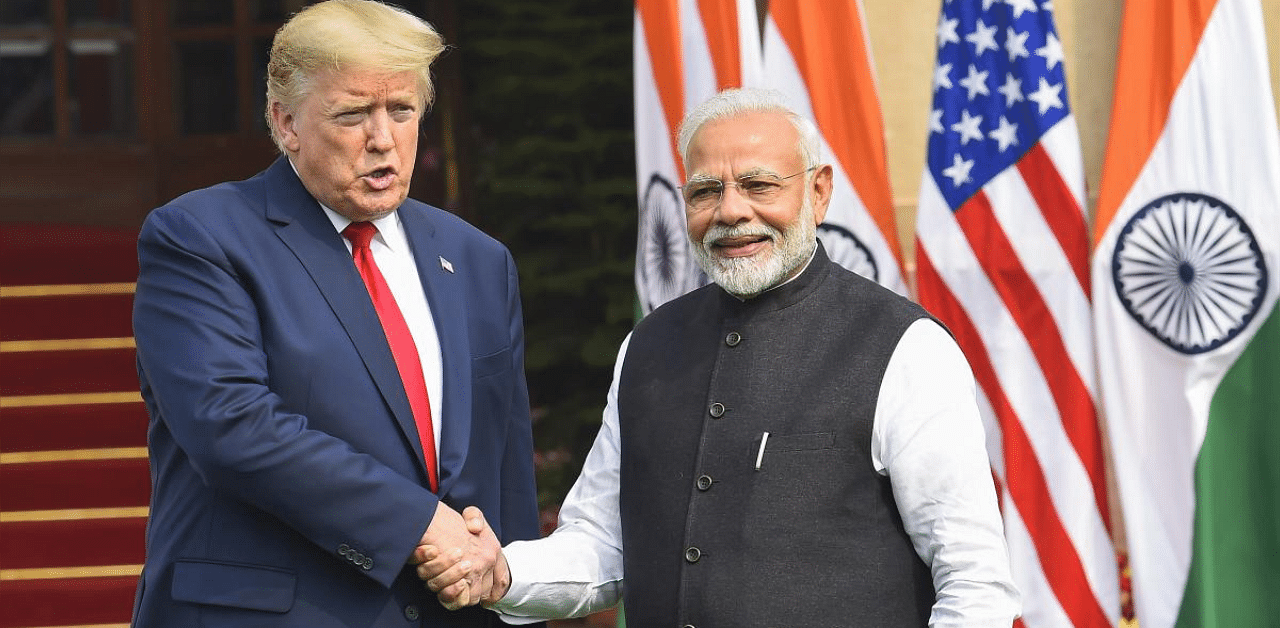
Less than a month before his imminent exit from the White House, President Donald Trump has conferred an award to Prime Minister Narendra Modi recognising his role in enhancing defence partnership between India and the United States to meet “shared challenges”.
The “Legion of Merit, Degree Chief Commander”, which Trump conferred on Modi, is a “rarely-awarded prestigious decoration” the United States Presidents bestow upon foreign heads of states or heads of governments.
Taranjit Singh Sandhu, New Delhi’s envoy to Washington DC, accepted the award on behalf of the Prime Minister from US National Security Advisor Robert O’Brien early on Tuesday.
Modi stated in a tweet that he was “deeply honoured” to be awarded the Legion of Merit by Trump. With Joe Biden set to take over the Oval Office on January 20 next year, the Prime Minister referred to the support from both Republicans and Democrats in the US for the strategic partnership with India. He also noted the cross-party support in India for strong ties with the US.
“The 21st century presents both unprecedented challenges as well as opportunities. The India-US relationship can leverage the vast potential of our people's unique strengths to provide global leadership for the benefit of entire humanity,” Modi posted in Twitter, reiterating his government’s “firm conviction and commitment to continue working with the US government, and all other stakeholders in both countries, for further strengthening India-US ties”.
The citation that the Trump Administration presented to the Prime Minister along with the award referred to India as “a key partner” for the US in the Indo-Pacific.
It did not directly refer to growing strategic convergence between India and the US in the Indo-Pacific region to counter hegemonic moves by China. It, however, mentioned about “increasing collaboration” between the two nations “to ensure freedom of the seas, open and transparent investment and infrastructure development, secure and reliable digital networks, and good governance” – the euphemism used to oppose China’s aggression in the South China Sea and the East China Sea as well as the predatory lending policies it was accused of using in its controversial Belt and Road Initiative to put smaller nations in its debt trap and its alleged use of state-owned telecom companies for espionage in other countries.
The US Legion of Merit award has four variants – Degree of Chief Commander, Degree of Commander, Degree of Officer and Degree of Legionnaire. The Degree of Chief Commander is generally reserved for the foreign Heads of States and Heads of Governments. The US had conferred the award on the then Turkish President Kenan Evren in 1988. After a three-decade-long hiatus, Trump revived the tradition of honouring foreign leaders with the award by conferring it on Emir of Kuwait Sheikh Sabah Al-Ahmed Al-Jaber Al-Sabah on September 18 this year.
Along with Modi, Australian Prime Minister Scott Morrison and former Japanese Prime Minister Shinzo Abe also received the US award on Tuesday.
India, Japan, Australia and the US in November 2017 re-launched the ‘Quad’ – an informal coalition of the four democracies to counter China’s expansionist aspirations in the Indo-Pacific region.
2020 saw renewed push by the four nations to step up mutual cooperation, amid growing belligerence of China, not only along its disputed boundary with India, but also in the South China Sea, the East China Sea and the Taiwan Strait.
The navies of the four nations had a naval exercise – Malabar 2020 – in the Indian Ocean.
India also inked military logistics sharing pacts with Japan and Australia, following up on a similar agreement it had inked with the US in 2016. Though the Trump Administration was keen to formally turn the Quad into a NATO-like entity for the Indo-Pacific region, New Delhi was in favour of moving cautiously as it was hesitant to join a security architecture that would appear to be overtly adversarial to China.
